Jurgen (8)
By:
May 4, 2015
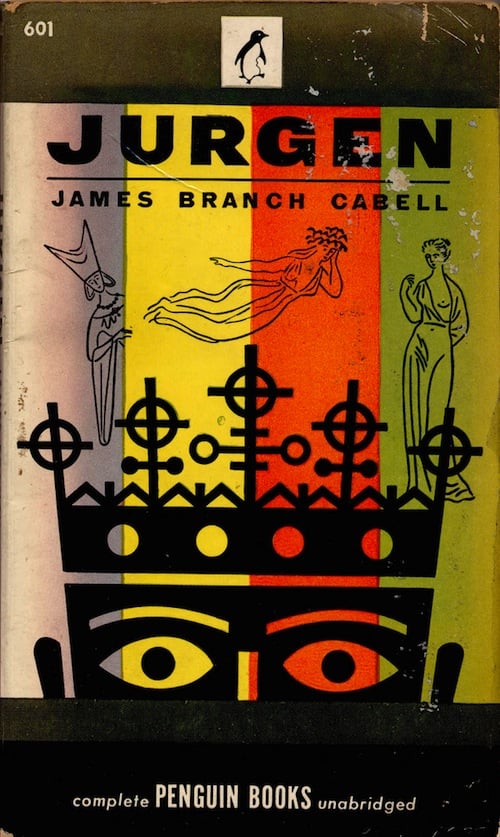
James Branch Cabell’s 1919 ironic fantasy novel Jurgen, A Comedy of Justice, the protagonist of which seduces women everywhere he travels — including into Arthurian legend and Hell itself — is (according to Aleister Crowley) one of the “epoch-making masterpieces of philosophy.” Cabell’s sardonic inversion of romantic fantasy was postmodernist avant la lettre. HiLoBooks is pleased to serialize Jurgen here at HILOBROW. Enjoy!
So it was that, riding upon a horse whose bridle was marked with a coronet, the pawnbroker returned to a place, and to a moment, which he remembered. It was rather queer to be a fine young fellow again, and to foresee all that was to happen for the next twenty years.
As it chanced, the first person he encountered was his mother Azra, whom Coth had loved very greatly but not long. And Jurgen talked with Azra of what clothes he would be likely to need in Gâtinais, and of how often he would write to her. She disparaged the new shirt he was wearing, as was to be expected, since Azra had always preferred to select her son’s clothing rather than trust to Jurgen’s taste. His new horse she admitted to be a handsome animal; and only hoped he had not stolen it from anybody who would get him into trouble. For Azra, it must be recorded, had never any confidence in her son; and was the only woman, Jurgen felt, who really understood him.
And now as his beautiful young mother impartially petted and snapped at him, poor Jurgen thought of that very real dissension and severance which in the oncoming years was to arise between them; and of how she would die without his knowing of her death for two whole months; and of how his life thereafter would be changed, somehow, and the world would become an unstable place in which you could no longer put cordial faith. And he foreknew all the remorse he was to shrug away, after the squandering of so much pride and love. But these things were not yet: and besides, these things were inevitable.
“And yet that these things should be inevitable is decidedly not fair,” said Jurgen.
So it was with all the persons he encountered. The people whom he loved when at his best as a fine young fellow were so very soon, and through petty causes, to become nothing to him, and he himself was to be converted into a commonplace tradesman. And living seemed to Jurgen a wasteful and inequitable process.
Then Jurgen left the home of his youth, and rode toward Bellegarde, and tethered his horse upon the heath, and went into the castle. Thus Jurgen came to Dorothy. She was lovely and dear, and yet, by some odd turn, not quite so lovely and dear as the Dorothy he had seen in the garden between dawn and sunrise. And Dorothy, like everybody else, praised Jurgen’s wonderful new shirt.
“It is designed for such festivals,” said Jurgen, modestly — “a little notion of my own. A bit extreme, some persons might consider it, but there is no pleasing everybody. And I like a trifle of color.”
For there was a masque that night at the castle of Bellegarde: and wildly droll and sad it was to Jurgen to remember what was to befall so many of the participants.
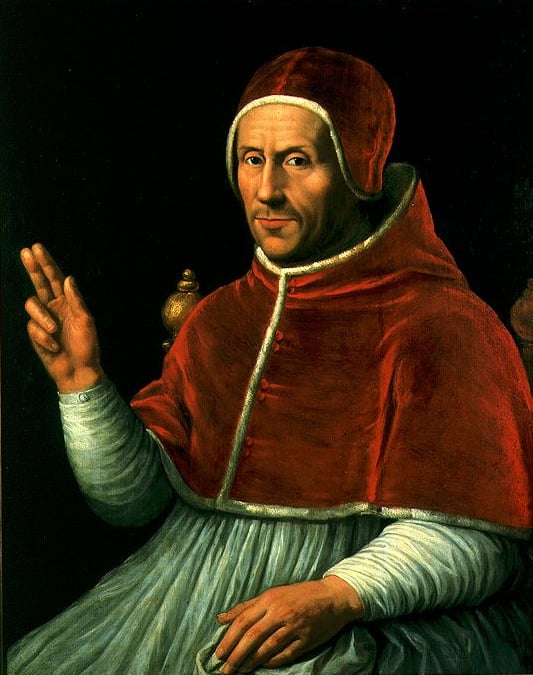
Jurgen had not forgotten this Wednesday, this ancient Wednesday upon which Messire de Montors had brought the Confraternity of St. Médard from Brunbelois, to enact a masque of The Birth of Hercules, as the vagabonds were now doing, to hilarious applause. Jurgen remembered it was the day before Bellegarde discovered that Count Emmerick’s guest, the Vicomte de Puysange, was in reality the notorious outlaw, Perion de la Forêt. Well, yonder the yet undetected impostor was talking very earnestly with Dame Melicent: and Jurgen knew all that was in store for this pair of lovers.
Meanwhile, as Jurgen reflected, the real Vicomte de Puysange was at this moment lying in a delirium, yonder at Benoit’s: to-morrow the true Vicomte would be recognized, and within the year the Vicomte would have married Félise de Soyecourt, and later Jurgen would meet her, in the orchard; and Jurgen knew what was to happen then also.
And Messire de Montors was watching Dame Melicent, sidewise, while he joked with little Ettarre, who was this night permitted to stay up later than usual, in honor of the masque: and Jurgen knew that this young bishop was to become Pope of Rome, no less; and that the child he joked with was to become the woman for possession of whom Guiron des Rocques and the surly-looking small boy yonder, Maugis d’Aigremont, would contend with each other until the country hereabouts had been devastated, and the castle wherein Jurgen now was had been besieged, and this part of it burned. And wildly droll and sad it was to Jurgen thus to remember all that was going to happen to these persons, and to all the other persons who were frolicking in the shadow of their doom and laughing at this trivial masque.
For here — with so much of ruin and failure impending, and with sorrow prepared so soon to smite a many of these revellers in ways foreknown to Jurgen; and with death resistlessly approaching so soon to make an end of almost all this company in some unlovely fashion that Jurgen foreknew exactly, — here laughter seemed unreasonable and ghastly. Why, but Reinault yonder, who laughed so loud, with his cropped head flung back: would Reinault be laughing in quite this manner if he knew the round strong throat he thus exposed was going to be cut like the throat of a calf, while three Burgundians held him? Jurgen knew this thing was to befall Reinault Vinsauf before October was out. So he looked at Reinault’s throat, and shudderingly drew in his breath between set teeth.
“And he is worth a score of me, this boy!” thought Jurgen: “and it is I who am going to live to be an old fellow, with my bit of land in fee, years after dirt clogs those bright generous eyes, and years after this fine big-hearted boy is wasted! And I shall forget all about him, too. Marion l’Edol, that very pretty girl behind him, is to become a blotched and toothless haunter of alleys, a leering plucker at men’s sleeves! And blue-eyed Colin here, with his baby mouth, is to be hanged for that matter of coin-clipping—let me recall, now,—yes, within six years of to-night! Well, but in a way, these people are blessed in lacking foresight. For they laugh, and I cannot laugh, and to me their laughter is more terrible than weeping. Yes, they may be very wise in not glooming over what is inevitable; and certainly I cannot go so far as to say they are wrong: but still, at the same time—! And assuredly, living seems to me in everything a wasteful and inequitable process.”
Thus Jurgen, while the others passed a very pleasant evening.
And presently, when the masque was over, Dorothy and Jurgen went out upon the terrace, to the east of Bellegarde, and so came to an unforgotten world of moonlight. They sat upon a bench of carved stone near the balustrade which overlooked the highway: and the boy and the girl gazed wistfully beyond the highway, over luminous valleys and tree-tops. Just so they had sat there, as Jurgen perfectly remembered, when Mother Sereda first used this Wednesday.
“My Heart’s Desire,” says Jurgen, “I am sad to-night. For I am thinking of what life will do to us, and what offal the years will make of you and me.”
“My own sweetheart,” says she, “and do we not know very well what is to happen?” And Dorothy began to talk of all the splendid things that Jurgen was to do, and of the happy life which was to be theirs together.
“It is horrible,” he said: “for we are more fine than we shall ever be hereafter. We have a splendor for which the world has no employment. It will be wasted. And such wastage is not fair.”
“But presently you will be so and so,” says she: and fondly predicts all manner of noble exploits which, as Jurgen remembered, had once seemed very plausible to him also. Now he had clearer knowledge as to the capacities of the boy of whom he had thought so well.
“No, Heart’s Desire: no, I shall be quite otherwise.”
“— and to think how proud I shall be of you! ‘But then I always knew it’, I shall tell everybody, very condescendingly —”
“No, Heart’s Desire: for you will not think of me at all.”
“Ah, sweetheart! and can you really believe that I shall ever care a snap of my fingers for anybody but you?”
Then Jurgen laughed a little; for Heitman Michael came now across the lonely terrace, in search of Madame Dorothy: and Jurgen foreknew this was the man to whom within two months of this evening Dorothy was to give her love and all the beauty that was hers, and with whom she was to share the ruinous years which lay ahead.
But the girl did not know this, and Dorothy gave a little shrugging gesture. “I have promised to dance with him, and so I must. But the old fellow is a great plague.”
For Heitman Michael was nearing thirty, and this to Dorothy and Jurgen was an age that bordered upon senility.
“Now, by heaven,” said Jurgen, “wherever Heitman Michael does his next dancing it will not be hereabouts.”
Jurgen had decided what he must do.
And then Heitman Michael saluted them civilly. “But I fear I must rob you of this fair lady, Master Jurgen,” says he.
Jurgen remembered that the man had said precisely this a score of years ago; and that Jurgen had mumbled polite regrets, and had stood aside while Heitman Michael bore off Dorothy to dance with him. And this dance had been the beginning of intimacy between Heitman Michael and Dorothy.
“Heitman,” says Jurgen, “the bereavement which you threaten is very happily spared me, since, as it happens, the next dance is to be mine.”
“We can but leave it to the lady,” says Heitman Michael, laughing.
“Not I,” says Jurgen. “For I know too well what would come of that. I intend to leave my destiny to no one.”
“Your conduct, Master Jurgen, is somewhat strange,” observed Heitman Michael.
“Ah, but I will show you a thing yet stranger. For, look you, there seem to be three of us here on this terrace. Yet I can assure you there are four.”
“Read me the riddle, my boy, and have done.”
“The fourth of us, Heitman, is a goddess that wears a speckled garment and has black wings. She can boast of no temples, and no priests cry to her anywhere, because she is the only deity whom no prayers can move or any sacrifices placate. I allude, sir, to the eldest daughter of Nox and Erebus.”
“You speak of death, I take it.”
“Your apprehension, Heitman, is nimble. Even so, it is not quick enough, I fear, to forerun the whims of goddesses. Indeed, what person could have foreseen that this implacable lady would have taken such a strong fancy for your company.”
“Ah, my young bantam,” replies Heitman Michael, “it is quite true that she and I are acquainted. I may even boast of having despatched one or two stout warriors to serve her underground. Now, as I divine your meaning, you plan that I should decrease her obligation by sending her a whippersnapper.”
“My notion, Heitman, is that since this dark goddess is about to leave us, she should not, in common gallantry, be permitted to go hence unaccompanied. I propose, therefore, that we forthwith decide who is to be her escort.”
Now Heitman Michael had drawn his sword. “You are insane. But you extend an invitation which I have never yet refused.”
“Heitman,” cries Jurgen, in honest gratitude and admiration, “I bear you no ill-will. But it is highly necessary you die to-night, in order that my soul may not perish too many years before my body.”
With that he too whipped out his sword.
So they fought. Now Jurgen was a very acceptable swordsman, but from the start he found in Heitman Michael his master. Jurgen had never reckoned upon that, and he considered it annoying. If Heitman Michael perforated Jurgen the future would be altered, certainly, but not quite as Jurgen had decided it ought to be remodeled. So this unlooked-for complication seemed preposterous, and Jurgen began to be irritated by the suspicion that he was getting himself killed for nothing at all.
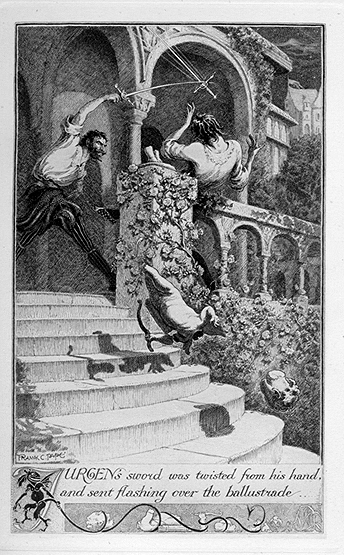
Meanwhile his unruffled tall antagonist seemed but to play with Jurgen, so that Jurgen was steadily forced back toward the balustrade. And presently Jurgen’s sword was twisted from his hand, and sent flashing over the balustrade, into the public highway.
“So now, Master Jurgen,” says Heitman Michael, “that is the end of your nonsense. Why, no, there is not any occasion to posture like a statue. I do not intend to kill you. Why the devil’s name, should I? To do so would only get me an ill name with your parents: and besides it is infinitely more pleasant to dance with this lady, just as I first intended.” And he turned gaily toward Madame Dorothy.
But Jurgen found this outcome of affairs insufferable. This man was stronger than he, this man was of the sort that takes and uses gallantly all the world’s prizes which mere poets can but respectfully admire. All was to do again: Heitman Michael, in his own hateful phrase, would act just as he had first intended, and Jurgen would be brushed aside by the man’s brute strength. This man would take away Dorothy, and leave the life of Jurgen to become a business which Jurgen remembered with distaste. It was unfair.
So Jurgen snatched out his dagger, and drove it deep into the undefended back of Heitman Michael. Three times young Jurgen stabbed and hacked the burly soldier, just underneath the left ribs. Even in his fury Jurgen remembered to strike on the left side.
It was all very quickly done. Heitman Michael’s arms jerked upward, and in the moonlight his fingers spread and clutched. He made curious gurgling noises. Then the strength went from his knees, so that he toppled backward. His head fell upon Jurgen’s shoulder, resting there for an instant fraternally; and as Jurgen shuddered away from the abhorred contact, the body of Heitman Michael collapsed. Now he lay staring upward, dead at the feet of his murderer. He was horrible looking, but he was quite dead.
“What will become of you?” Dorothy whispered, after a while. “Oh, Jurgen, it was foully done, that which you did was infamous! What will become of you, my dear?”
“I will take my doom,” says Jurgen, “and without whimpering, so that I get justice. But I shall certainly insist upon justice.” Then Jurgen raised his face to the bright heavens. “The man was stronger than I and wanted what I wanted. So I have compromised with necessity, in the only way I could make sure of getting that which was requisite to me. I cry for justice to the power that gave him strength and gave me weakness, and gave to each of us his desires. That which I have done, I have done. Now judge!”
Then Jurgen tugged and shoved the heavy body of Heitman Michael, until it lay well out of sight, under the bench upon which Jurgen and Dorothy had been sitting. “Rest there, brave sir, until they find you. Come to me now, my Heart’s Desire. Good, that is excellent. Here I sit with my true love, upon the body of my enemy. Justice is satisfied, and all is quite as it should be. For you must understand that I have fallen heir to a fine steed, whose bridle is marked with a coronet, — prophetically, I take it,—and upon this steed you will ride pillion with me to Lisuarte. There we will find a priest to marry us. We will go together into Gâtinais. Meanwhile, there is a bit of neglected business to be attended to.” And he drew the girl close to him.
For Jurgen was afraid of nothing now. And Jurgen thought:
“Oh, that I could detain the moment! that I could make some fitting verses to preserve this moment in my own memory! Could I but get into words the odor and the thick softness of this girl’s hair as my hands, that are a-quiver in every nerve of them, caress her hair; and get into enduring words the glitter and the cloudy shadowings of her hair in this be-drenching moonlight! For I shall forget all this beauty, or at best I shall remember this moment very dimly.”
“You have done very wrong—” says Dorothy.
Says Jurgen, to himself: “Already the moment passes this miserably happy moment wherein once more life shudders and stands heart-stricken at the height of bliss! it passes, and I know even as I lift this girl’s soft face to mine, and mark what faith and submissiveness and expectancy is in her face, that whatever the future holds for us, and whatever of happiness we two may know hereafter, we shall find no instant happier than this, which passes from us irretrievably while I am thinking about it, poor fool, in place of rising to the issue.”
“—And heaven only knows what will become of you Jurgen—”
Says Jurgen, still to himself: “Yes, something must remain to me of all this rapture, though it be only guilt and sorrow: something I mean to wrest from this high moment which was once wasted fruitlessly. Now I am wiser: for I know there is not any memory with less satisfaction in it than the memory of some temptation we resisted. So I will not waste the one real passion I have known, nor leave unfed the one desire which ever caused me for a heart-beat to forget to think about Jurgen’s welfare. And thus, whatever happens, I shall not always regret that I did not avail myself of this girl’s love before it was taken from me.”
So Jurgen made such advances as seemed good to him. And he noted, with amusing memories of how much afraid he had once been of shocking his Dorothy’s notions of decorum, that she did not repulse him very vigorously.
“Here, over a dead body! Oh, Jurgen, this is horrible! Now, Jurgen, remember that somebody may come any minute! And I thought I could trust you! Ah, and is this all the respect you have for me!” This much she said in duty. Meanwhile the eyes of Dorothy were dilated and very tender.
“Faith, I take no chances, this second time. And so whatever happens, I shall not always regret that which I left undone.”
Now upon his lips was laughter, and his arms were about the submissive girl. And in his heart was an unnamable depression and a loneliness, because it seemed to him that this was not the Dorothy whom he had seen in the garden between dawn and sunrise. For in my arms now there is just a very pretty girl who is not over-careful in her dealings with young men, thought Jurgen, as their lips met. Well, all life is a compromise; and a pretty girl is something tangible, at any rate. So he laughed, triumphantly, and prepared for the sequel.
But as Jurgen laughed triumphantly, with his arm beneath the head of Dorothy, and with the tender face of Dorothy passive beneath his lips, and with unreasonable wistfulness in his heart, the castle bell tolled midnight. What followed was curious: for as Wednesday passed, the face of Dorothy altered, her flesh roughened under his touch, and her cheeks fell away, and fine lines came about her eyes, and she became the Countess Dorothy whom Jurgen remembered as Heitman Michael’s wife. There was no doubt about it, in that be-drenching moonlight: and she was leering at him, and he was touching her everywhere, this horrible lascivious woman, who was certainly quite old enough to know better than to permit such liberties. And her breath was sour and nauseous. Jurgen drew away from her, with a shiver of loathing, and he closed his eyes, to shut away that sensual face.
“No,” he said; “it would not be fair to what we owe to others. In fact, it would be a very heinous sin. We should weigh such considerations occasionally, madame.”
Then Jurgen left his temptress, with simple dignity. “I go to search for my dear wife, madame, in a frame of mind which I would strongly advise you to adopt toward your husband.”
And he went straightway down the terraces of Bellegarde, and turned southward to where his horse was tethered upon Amneran Heath: and Jurgen was feeling very virtuous.
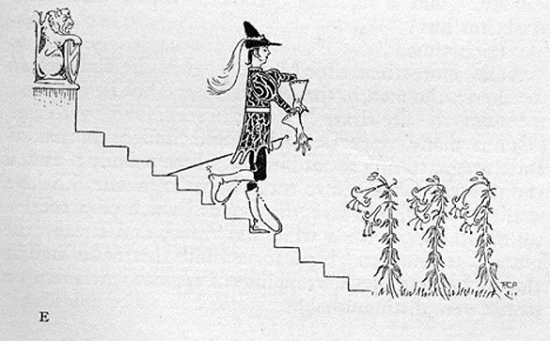
Footnotes from Notes on Jurgen (1928), by James P. Cover — with additional comments from the creators of this website; rewritten, in some instances, by HiLoBooks.
* Messire de Montors — Ayrart de Montors was the second son of Dom Manuel’s half-sister, Matthiette. According to Mr. Cabell, he held the papal chair as Adrian VII from 1268 to 1271. Historians less well informed than Mr. Cabell say there was no Pope Adrian VII and that, from 1268 to 1271, the papacy was vacant.
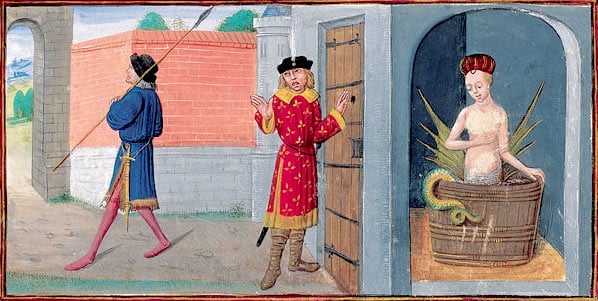
* Brunbelois — Brunbelois was a mountain in Northumberland in which the fairy Mélusine was fabled to have imprisoned her father, Helymas.
* Perion de la Forêt — This was the lover of Manuel’s eldest daughter, Melicent. According to The Lineage of Lichfeld, he was the father of Raymondin de la Forêt, who figures in the famous Lusignan legend as the husband of Mélusine.
* Vicomte de Puysange — This is the philanthropic gentleman who gave his name and title to the child of Jurgen and Félise.
* Melicent — Melicent was Dom Manuel’s eldest child.
* Félise de Soyecourt — Later Félise de Puysange. For Jurgen’s dealings with her, see the foreword to “The Wedding Jest” in The Line of Love.
* Ettarre — For the chaste, but somewhat protracted, love affairs of this youngest of Manuel’s daughters, see The Cream of the Jest. Lin Carter’s introduction to the 1971 Ballantine Books reprint of The Cream of the Jest includes this comment:
…about “Ettarre”, the eternally pursued, ideal woman, it has, not unnaturally, been suggested that she may represent some lost love of Cabell’s youth even as Felix Kennaston/Horvendile obviously is meant to represent Cabell himself. This may or may not be so: at any rate, Cabellists usually derive “Ettarre” from the medieval French romances. But only last week, I was browsing through a reference work called Mythology of All Races (Boston, 1918) and, in Volume III, devoted to the Irish myths, I ran across a reference to “Caibell and Etar, rulers of the sid-folk, the sidhe, or Fairies…”
* Guiron des Rocques — In The Cream of the Jest, Sir Guiron is the most moral and high-minded champion who, for a while, at least, wins the love of Ettarre.
* Maugis d’Aigremont — This was the hero of a medieval romance, Maugis d’Aigremont et Vivien son Frère. For his place in the legends of Poictesme, where he figures as a lover of Ettarre, see Book First of The Cream of the Jest. Lin Carter’s introduction to the 1971 Ballantine Books reprint of The Cream of the Jest speculates that the name Maugis d’Aigremont derives from “the old French romancers”.
* Lisuarte — Lin Carter’s introduction to the 1971 Ballantine Books reprint of The Cream of the Jest includes this theory:
The town of Lisuarte in Poictesme is mentioned in Chapter II; if you have ever read the great fantastic romance Amadis of Gaul, you may remember that the imaginary King of Britain in that book is named Lisuarte; how typical of Cabell to name a town in his imaginary realm of Poictesme after an imaginary king in somebody else’s romance.
RADIUM AGE SCIENCE FICTION: “Radium Age” is HILOBROW’s name for the 1904–33 era, which saw the discovery of radioactivity, the revelation that matter itself is constantly in movement — a fitting metaphor for the first decades of the 20th century, during which old scientific, religious, political, and social certainties were shattered. This era also saw the publication of genre-shattering writing by Edgar Rice Burroughs, Sax Rohmer, E.E. “Doc” Smith, Jack London, Arthur Conan Doyle, Aldous Huxley, Olaf Stapledon, Karel Čapek, H.P. Lovecraft, Charlotte Perkins Gilman, Yevgeny Zamyatin, Philip Gordon Wylie, and other pioneers of post-Verne/Wells, pre-Golden Age “science fiction.” More info here.
READ GORGEOUS PAPERBACKS: HiLoBooks has reissued the following 10 obscure but amazing Radium Age science fiction novels in beautiful print editions: Jack London’s The Scarlet Plague, Rudyard Kipling’s With the Night Mail (and “As Easy as A.B.C.”), Arthur Conan Doyle’s The Poison Belt, H. Rider Haggard’s When the World Shook, Edward Shanks’ The People of the Ruins, William Hope Hodgson’s The Night Land, J.D. Beresford’s Goslings, E.V. Odle’s The Clockwork Man, Cicely Hamilton’s Theodore Savage, and Muriel Jaeger’s The Man with Six Senses. For more information, visit the HiLoBooks homepage.
SERIALIZED BY HILOBOOKS: Jack London’s The Scarlet Plague | Rudyard Kipling’s With the Night Mail (and “As Easy as A.B.C.”) | Arthur Conan Doyle’s The Poison Belt | H. Rider Haggard’s When the World Shook | Edward Shanks’ The People of the Ruins | William Hope Hodgson’s The Night Land | J.D. Beresford’s Goslings | E.V. Odle’s The Clockwork Man | Cicely Hamilton’s Theodore Savage | Muriel Jaeger’s The Man With Six Senses | Jack London’s “The Red One” | Philip Francis Nowlan’s Armageddon 2419 A.D. | Homer Eon Flint’s The Devolutionist | W.E.B. DuBois’s “The Comet” | Edgar Rice Burroughs’s The Moon Men | Charlotte Perkins Gilman’s Herland | Sax Rohmer’s “The Zayat Kiss” | Eimar O’Duffy’s King Goshawk and the Birds | Frances Hodgson Burnett’s The Lost Prince | Morley Roberts’s The Fugitives | Helen MacInnes’s The Unconquerable | Geoffrey Household’s Watcher in the Shadows | William Haggard’s The High Wire | Hammond Innes’s Air Bridge | James Branch Cabell’s Jurgen | John Buchan’s “No Man’s Land” | John Russell’s “The Fourth Man” | E.M. Forster’s “The Machine Stops” | John Buchan’s Huntingtower | Arthur Conan Doyle’s When the World Screamed | Victor Bridges’ A Rogue By Compulsion | Jack London’s The Iron Heel | H. De Vere Stacpoole’s The Man Who Lost Himself | P.G. Wodehouse’s Leave It to Psmith | Richard Connell’s “The Most Dangerous Game” | Houdini and Lovecraft’s “Imprisoned with the Pharaohs” | Arthur Conan Doyle’s “The Sussex Vampire”.
ORIGINAL FICTION: HILOBROW has serialized three novels: James Parker’s The Ballad of Cocky The Fox (“a proof-of-concept that serialization can work on the Internet” — The Atlantic); Karinne Keithley Syers’s Linda Linda Linda (which includes original music); and Robert Waldron’s roman à clef The School on the Fens. We also publish original stories and comics. These include: Matthew Battles’s stories “Gita Nova“, “Makes the Man,” “Imago,” “Camera Lucida,” “A Simple Message”, “Children of the Volcano”, “The Gnomon”, “Billable Memories”, “For Provisional Description of Superficial Features”, “The Dogs in the Trees”, “The Sovereignties of Invention”, and “Survivor: The Island of Dr. Moreau”; several of these later appeared in the collection The Sovereignties of Invention | Peggy Nelson’s “Mood Indigo“, “Top Kill Fail“, and “Mercerism” | Annalee Newitz’s “The Great Oxygen Race” | Flourish Klink’s Star Trek fanfic “Conference Comms” | Charlie Mitchell’s “A Fantasy Land” | Charlie Mitchell’s “Sentinels” | Joshua Glenn’s “The Lawless One”, and the mashup story “Zarathustra vs. Swamp Thing” | Adam McGovern and Paolo Leandri’s Idoru Jones comics | John Holbo’s “Sugarplum Squeampunk” | “Another Corporate Death” (1) and “Another Corporate Death” (2) by Mike Fleisch | Kathryn Kuitenbrouwer and Frank Fiorentino’s graphic novel “The Song of Otto” (excerpt) | John Holbo’s graphic novel On Beyond Zarathustra (excerpt) | “Manoj” and “Josh” by Vijay Balakrishnan | “Verge” by Chris Rossi, and his audio novel Low Priority Hero | EPIC WINS: THE ILIAD (1.408-415) by Flourish Klink | EPIC WINS: THE KALEVALA (3.1-278) by James Parker | EPIC WINS: THE ARGONAUTICA (2.815-834) by Joshua Glenn | EPIC WINS: THE MYTH OF THE ELK by Matthew Battles | TROUBLED SUPERHUMAN CONTEST: Charles Pappas, “The Law” | CATASTROPHE CONTEST: Timothy Raymond, “Hem and the Flood” | TELEPATHY CONTEST: Rachel Ellis Adams, “Fatima, Can You Hear Me?” | OIL SPILL CONTEST: A.E. Smith, “Sound Thinking | LITTLE NEMO CAPTION CONTEST: Joe Lyons, “Necronomicon” | SPOOKY-KOOKY CONTEST: Tucker Cummings, “Well Marbled” | INVENT-A-HERO CONTEST: TG Gibbon, “The Firefly” | FANFICTION CONTEST: Lyette Mercier’s “Sex and the Single Superhero”
